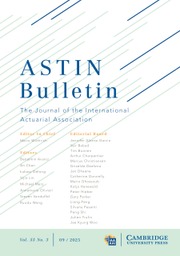Crossref Citations
This article has been cited by the following publications. This list is generated based on data provided by
Crossref.
Heilmann, Wolf-Rüdiger
1992.
Operations Research Proceedings 1991.
p.
1.
Ebanks, B.
Karwowski, W.
and
Ostaszewski, K.
1992.
Application of measures of fuzziness to risk classification in insurance.
p.
290.
Ibern i Regás, Pere
1995.
La concentración de los costes sanitarios per cápita y el control del riesgo.
Gaceta Sanitaria,
Vol. 9,
Issue. 47,
p.
133.
Narayanaswamy, Pradeep
Bector, C.R.
and
Rajamani, Divakar
1996.
Fuzzy logic concepts applied to machine—component matrix formation in cellular manufacturing.
European Journal of Operational Research,
Vol. 93,
Issue. 1,
p.
88.
David Cummins, J.
and
Derrig, Richard A.
1997.
Fuzzy Financial Pricing of Property-Liability Insurance.
North American Actuarial Journal,
Vol. 1,
Issue. 4,
p.
21.
Frees, Edward W.
and
Valdez, Emiliano A.
1998.
Understanding Relationships Using Copulas.
North American Actuarial Journal,
Vol. 2,
Issue. 1,
p.
1.
Derrig, Richard A.
and
Ostaszewski, Krzysztof M.
1999.
Practical Applications of Fuzzy Technologies.
Vol. 6,
Issue. ,
p.
531.
Shapiro, Arnold F.
and
Paul Gorman, R.
2000.
Implementing adaptive nonlinear models.
Insurance: Mathematics and Economics,
Vol. 26,
Issue. 2-3,
p.
289.
Rosaria Simonelli, Maria
2001.
Fuzziness in valuing financial instruments by certainty equivalents.
European Journal of Operational Research,
Vol. 135,
Issue. 2,
p.
296.
Shapiro, Arnold F
2002.
The merging of neural networks, fuzzy logic, and genetic algorithms.
Insurance: Mathematics and Economics,
Vol. 31,
Issue. 1,
p.
115.
Shapiro, Arnold F.
2002.
Hybrid Information Systems.
p.
695.
De Andrés Sánchez, Jorge
and
Terceño Gómez, Antonio
2003.
Applications of Fuzzy Regression in Actuarial Analysis.
Journal of Risk and Insurance,
Vol. 70,
Issue. 4,
p.
665.
Terceño, Antonio
de Andrés, Jorge
Barberà, Glòria
and
Lorenzana, Tomás
2003.
Using Fuzzy Set Theory to Analyse Investments and Select Portfolios of Tangible Investments in Uncertain Environments.
International Journal of Uncertainty, Fuzziness and Knowledge-Based Systems,
Vol. 11,
Issue. 03,
p.
263.
de Andrés Sánchez, Jorge
and
Gómez, Antonio Terceño
2003.
Estimating a term structure of interest rates for fuzzy financial pricing by using fuzzy regression methods.
Fuzzy Sets and Systems,
Vol. 139,
Issue. 2,
p.
313.
Derrig, Richard A.
and
Ostaszewski, Krzysztof M.
2004.
Encyclopedia of Actuarial Science.
Shapiro, Arnold F.
2004.
Fuzzy logic in insurance.
Insurance: Mathematics and Economics,
Vol. 35,
Issue. 2,
p.
399.
de Andrés Sánchez, Jorge
and
Terceño Gómez, Antonio
2004.
Estimating a fuzzy term structure of interest rates using fuzzy regression techniques.
European Journal of Operational Research,
Vol. 154,
Issue. 3,
p.
804.
Koissi, Marie-Claire
and
Shapiro, Arnold F.
2006.
Fuzzy formulation of the Lee–Carter model for mortality forecasting.
Insurance: Mathematics and Economics,
Vol. 39,
Issue. 3,
p.
287.
Lai, Li-Hua
2006.
Underwriting profit margin of P/L insurance in the fuzzy-ICAPM.
The Geneva Risk and Insurance Review,
Vol. 31,
Issue. 1,
p.
23.
Sánchez, Jorge de Andrés
2006.
Calculating insurance claim reserves with fuzzy regression.
Fuzzy Sets and Systems,
Vol. 157,
Issue. 23,
p.
3091.


